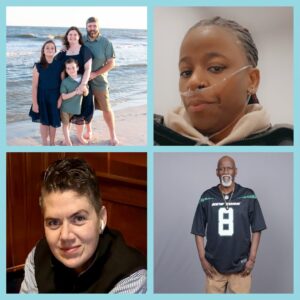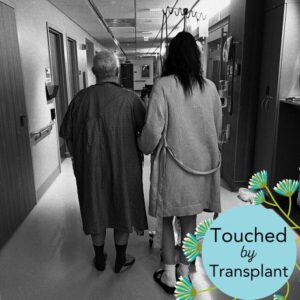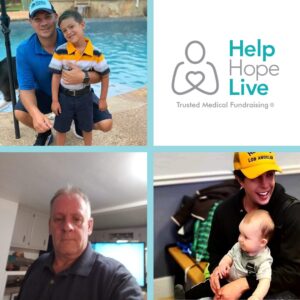Anna Crum was in junior high school when she began to experience persistent double vision and sixth cranial nerve palsy in her left eye. An MRI revealed that Anna was fighting relapsing and remitting multiple sclerosis (RRMS). Anna explains how she holds onto hope while fighting the debilitating mental and physical effects of RRMS.
How do your RRMS symptoms disrupt your daily life?
Shortly after the diagnosis, I became legally blind and had to learn to read Braille and rely on a cane for mobility. My current list of symptoms has grown to include a different diplopia (double vision) in each eye, color discrepancy, contrast loss, nerve pain on the left side of my face, muscle weakness in my left leg, short-term memory difficulties, fatigue, bowel and bladder dysfunction, and the occasional slurred speech. Without special lenses, I would not be able to read or drive.
My symptoms are unpredictable. On a given day, there is a long list of things that can go wrong. But you try to plan and compensate as best you can to hopefully manage some of the more severe symptoms to prevent them from hindering your daily life.
What has been the most difficult part of your struggle with RRMS?
MS finds a way to keep chipping away at your independence. In my case, it took everything I had to make it through college. Despite my success, I am now living back at home, unable to work full time and leaning on family for support. MS forces you to reach out. Admitting you need help and accepting it can be very difficult, especially if you are naturally an introverted person who is goal-driven and independent.
Why do you think people with MS sometimes hide their illness from the world?
You encounter enough people who don’t understand and eventually you learn to blend in. I have many times described myself as an illusionist and I am sure other people living with chronic illnesses can relate. People don’t see the preparation or the aftermath.
Everything in my life has become so calculated. I plan how much walking I will need to do in a day, how many hours of energy I have, how much my eyes can handle or how much pain I can tolerate ahead of time. Everything is staged. Seldom do I let people see the daily struggle [and] the days where I can’t even get out of bed.
Do you have a resolution for 2016?
This year, I am focusing on transparency, community and relationships. The National MS Society has a saying: “Multiple sclerosis destroys connections inside us. It disconnects the mind from the body and people from each other.” Too often, people with a chronic illness suffer in silence. When I was first diagnosed, I started advocating for awareness. It was a passion of mine. But eventually I lost the energy. All the energy I had focused on just surviving. Eventually I chose silence for security and traded my voice for a disguise in an attempt to mask my disease.
This year, I want to use my voice again; I want to make an impact. Hopefully my journey will help inspire someone else to keep pushing through. Too often those suffering wait until it’s dire before they reach out for help. Keeping the disease invisible gives it that much more power and it confines you. I want to inspire someone, somewhere, to not give up.
Why do you plan to embrace your MS this year?
At times it feels like a door slams in your face everywhere you turn, but you keep going, one step at a time. Eventually, MS gave me a new path. Because of my disease, I found a passion and hopefully an eventual career as a dietitian. I want to help others manage their symptoms as best as possible, improve their quality of life, and help them learn to thrive despite an illness. Nutrition isn’t a cure, but it can make a huge impact.
What advice can you give to someone newly diagnosed with MS?
Make your health your number one priority. I paid dearly for the instances where my priority became school or some other goal where I pushed myself too hard. Don’t push yourself to go at anyone else’s pace or to meet anyone else’s expectations.
Focusing on what you stand to lose or have lost is too overwhelming. Instead, focus on what your disease adds to your life. This disease builds character, teaches resourcefulness, ingenuity, adaptability, resilience, and gives you a unique perspective. You are stronger than you know, and maybe you can inspire someone with your unique story to find their own strength. Focus on what keeps you hopeful, and hold onto your tenacity.
What does hope mean to you?
To me, hope encompasses endless possibilities. There are always new ways to adapt, a new perspective to discover, new lessons to learn, new relationships to form. There is ALWAYS a reason to keep persevering.
Anna is currently studying to become a registered dietitian and is working on a photography project on the invisible symptoms of MS. She is fundraising with HelpHOPELive for a stem cell transplant that could improve her life with RRMS.
Anna Crum was in junior high school when she began to experience persistent double vision and sixth cranial nerve palsy in her left eye. An MRI revealed that Anna was fighting relapsing and remitting multiple sclerosis (RRMS). Anna explains how she holds onto hope while fighting the debilitating mental and physical effects of RRMS.
How do your RRMS symptoms disrupt your daily life?
Shortly after the diagnosis, I became legally blind and had to learn to read Braille and rely on a cane for mobility. My current list of symptoms has grown to include a different diplopia (double vision) in each eye, color discrepancy, contrast loss, nerve pain on the left side of my face, muscle weakness in my left leg, short-term memory difficulties, fatigue, bowel and bladder dysfunction, and the occasional slurred speech. Without special lenses, I would not be able to read or drive.
My symptoms are unpredictable. On a given day, there is a long list of things that can go wrong. But you try to plan and compensate as best you can to hopefully manage some of the more severe symptoms to prevent them from hindering your daily life.
What has been the most difficult part of your struggle with RRMS?
MS finds a way to keep chipping away at your independence. In my case, it took everything I had to make it through college. Despite my success, I am now living back at home, unable to work full time and leaning on family for support. MS forces you to reach out. Admitting you need help and accepting it can be very difficult, especially if you are naturally an introverted person who is goal-driven and independent.
Why do you think people with MS sometimes hide their illness from the world?
You encounter enough people who don’t understand and eventually you learn to blend in. I have many times described myself as an illusionist and I am sure other people living with chronic illnesses can relate. People don’t see the preparation or the aftermath.
Everything in my life has become so calculated. I plan how much walking I will need to do in a day, how many hours of energy I have, how much my eyes can handle or how much pain I can tolerate ahead of time. Everything is staged. Seldom do I let people see the daily struggle [and] the days where I can’t even get out of bed.
Do you have a resolution for 2016?
This year, I am focusing on transparency, community and relationships. The National MS Society has a saying: “Multiple sclerosis destroys connections inside us. It disconnects the mind from the body and people from each other.” Too often, people with a chronic illness suffer in silence. When I was first diagnosed, I started advocating for awareness. It was a passion of mine. But eventually I lost the energy. All the energy I had focused on just surviving. Eventually I chose silence for security and traded my voice for a disguise in an attempt to mask my disease.
This year, I want to use my voice again; I want to make an impact. Hopefully my journey will help inspire someone else to keep pushing through. Too often those suffering wait until it’s dire before they reach out for help. Keeping the disease invisible gives it that much more power and it confines you. I want to inspire someone, somewhere, to not give up.
Why do you plan to embrace your MS this year?
At times it feels like a door slams in your face everywhere you turn, but you keep going, one step at a time. Eventually, MS gave me a new path. Because of my disease, I found a passion and hopefully an eventual career as a dietitian. I want to help others manage their symptoms as best as possible, improve their quality of life, and help them learn to thrive despite an illness. Nutrition isn’t a cure, but it can make a huge impact.
What advice can you give to someone newly diagnosed with MS?
Make your health your number one priority. I paid dearly for the instances where my priority became school or some other goal where I pushed myself too hard. Don’t push yourself to go at anyone else’s pace or to meet anyone else’s expectations.
Focusing on what you stand to lose or have lost is too overwhelming. Instead, focus on what your disease adds to your life. This disease builds character, teaches resourcefulness, ingenuity, adaptability, resilience, and gives you a unique perspective. You are stronger than you know, and maybe you can inspire someone with your unique story to find their own strength. Focus on what keeps you hopeful, and hold onto your tenacity.
What does hope mean to you?
To me, hope encompasses endless possibilities. There are always new ways to adapt, a new perspective to discover, new lessons to learn, new relationships to form. There is ALWAYS a reason to keep persevering.
Anna is currently studying to become a registered dietitian and is working on a photography project on the invisible symptoms of MS. She is fundraising with HelpHOPELive for a stem cell transplant that could improve her life with RRMS.











